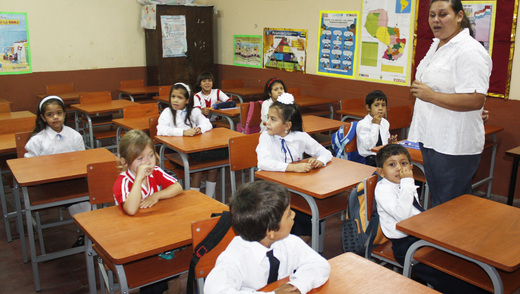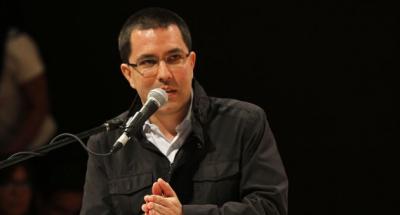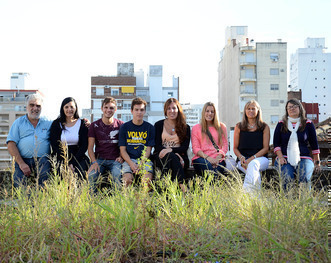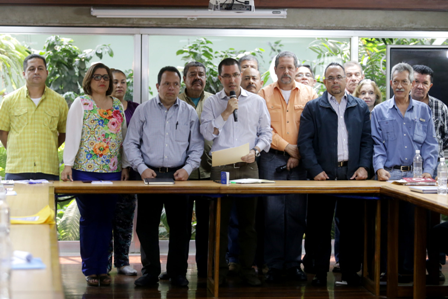El Manifiesto por la Paz que escribiera hace dos meses el Dr. Carlos Alberto Torres Presidente del Consejo Mundial de Sociedades de Educación Comparada lo colocamos hoy a disposición de investigadores, docentes y público en general . Señaló Torres que se iba a crear una Task Force for Peace Education en el Consejo Mundial ya que hay mucha gente interesada.
A continuación pueden leer la carta en ingles en el siguiente enlace:
A Peace Education Manifesto and the role of WCCES
From the desk of WCCES President Carlos Alberto Torres
Dear colleagues of societies of Comparative Education and Members of the Executive Committee.
“I am not impartial or objective; not a fixed observer of facts and happenings. I never was able to be an adherent of the traits that falsely claim impartiality or objectivity. That did not prevent me, however, from holding always a rigorously ethical position. Whoever really observes, does so from a given point of view. And this does not necessarily mean that the observer position is erroneous. It’s an error when one becomes dogmatic about one’s point of view and ignores the fact that, even one is certain about his or her point of view, it does not mean that one’s position is always ethically grounded.” (Paulo Freire)
Our age of global interdependence is being marked not only by the dialectics of the global and the local that we will discuss in Beijing, but also by the dialectics of terrorism and anti-terrorism. I am writing to you as President of WCCES but also as a victim of state terrorism in Argentina that forced me to exile. I would like to invite the WCCES to a dialogue about our moral responsibilities.
Paulo Freire taught us that domination, aggression and violence are intrinsic parts of human and social life. He argued that few human encounters are exempt from one type of oppression or another. By virtue of race, ethnicity, class and gender, people tend either to be victims or perpetrators of oppression. Thus, for Freire, sexism, racism, and class exploitation are the most salient forms of domination. Yet exploitation and domination exist on other grounds including religious beliefs, political affiliation, national origin, age, size, and physical and intellectual abilities, to name just a few. His vision was prophetic.
We are a professional organization with multiple goals including enhancing global understanding, improving access and quality of education and operation of the educational systems. Most of us are interested in developing and applying models, 2 methods, and theories for the field of comparative education to serve the betterment of children, youth and adults as well as communities and nations.
I have spent my whole academic life developing theories and analyses or conducting empirical research to promote global citizenship education working from Critical Theory in the politics of liberation. However, we cannot dialogue with violence. We cannot tolerate systematic violence against human rights and our existing civilizations, against common people in the streets, going to a market in Lebanon, returning home to Russia after vacations or massacred in restaurants, hotels and theaters like in Paris and Bamako.
Violence and terrorism are being inextricably connected with politics and religion in this globalized world. Violence that exists from Lebanon to a plane downed in the Sinai desert or to Paris, the city of which Thomas Jefferson, a strong supporter of the French Revolution argued that every citizen in the world has two capitals, their own and Paris. There is violence infecting us from Israel to Gaza, to Libya, Chad, Egypt, Tunisia, Afghanistan, Mali, Yemen, Turkey, Belgian and various regions of Middle East, North Africa, Sub-Saharan Africa and Central Asia. The violence that is gaining ground in America with the tragedy of students being slaughtered in Mexico, people being the subject of street violence in Brazil and Argentina, in Central America home of many of the most violent cities in the world and gang terror, with black lives that seem no matter to some in the USA. Not to mention the violence against our environment. The list is long. Violence should stop and peace should prevail. The recent terrorist acts that shocked the globe in Lebanon, the Sinai Peninsula, Nigeria, Paris and Bamako are simply another culmination of a long list of terrorist actions against democracy, humanism, pluralism, multiculturalism and the reign of reason. These violent acts should move us deeply both professionally and in terms of human interest. I convoke all of you today to react with a unanimous voice even though I am sure there are different perspectives, and different analysis of what is going on. Hence I do not expect people to wholesale agree with my analytical and normative perspective. But we should find a minimum common denominator to protect peace in the world. As comparative educators we have no other choice.
There are many faces of globalization, but particularly two that apply to this discussion: the globalization of anti-terrorism and terrorism going global. There is a manifestation of globalization, which extends beyond markets, and to some extent is against human rights. It is globalization of the international war against terrorism. This new form of globalization has been prompted in large part by the events of September 11th 2001— which were interpreted as the globalization of the terrorist threat— and the reaction of the United States to the event. This form of globalization is represented by the anti-terrorist response, which has been militaristic in nature, resulting in two coalition wars led by the US against Muslim regimes in Afghanistan and Iraq, under the auspices of the Global War Against Terror.
Islamophobia is also a theme of this globalization. Terrorism and the terrorist threat were made synonymous with Islam and Muslims, and became a global norm. Yet, the overall theme of this process was not only its military flavor, but also the emphasis on security and control of borders, people, capital, and commodities—that is, the reverse of open markets, high-paced commodity exchanges, and international understanding of “the other.” Security as a precondition of freedom is a key theme of this form of globalization.
There is another form of globalization namely the globalization of terrorism, which is well represented by the decaying Al Qaida network, with terrorist actions of many kinds and the more virulent example of ISIS and Boko Haram and their attempt to move the world to an apocalyptic war of unexpected proportions as a new Crusade. Examples of these actions include Boko Haram’s kidnapping of 300 girls from a Christian school in Nigeria, forcing them to convert to Islam and having them forcefully married to fighters. Another example is the growing consolidation of ISIS in the Middle East providing a platform, a kind of sacred fire for youth who are disaffected and marginalized with modernity and Western practices. Thousands of youths have flown to Iraq and Syria to fight for what they believe is their sacred cause of social change, leading to the establishment of a new Caliphate in the Levant and Middle East. Through a fatalistic and violently narrow interpretation, ISIS attempts to constitute and represent a global Islam, which makes them difficult to contain in a particular territory, as it has been the logic of counter-terrorism of the Obama administration. The motto of terrorism is probably best defined in the following terms: Only chaos will bring about freedom.
We must repudiate all acts of terror being made in the name of politics, religious fundamentalism, or any other of the multiple reasons why human rights are violated in the whole world. On the one hand, to invoke the name of God to conduct indiscriminate killings and barbarian beheadings is blasphemous. On the other, states need to be held responsible for violent retribution through military campaigns and exclusionary domestic policies. Furthermore, people throughout the world must maintain tolerance and mutual respect with those who are different rather than placing blame on the whole. Yet, we are reaching a point in which the world democratic system should act, and do so forcefully and efficiently.
If the intention of a religious fundamentalist project is to build a Global Caliphate to oppress, dominate, and exploit, and to build their dream at any cost with blatant disregard for the dreams of others, and for human lives, this project should be democratically but also forcefully confronted and stopped. Terrorists from any sign should be hunted, captured, prosecuted, and must pay their dues to justice.
As a Critical Theorist I understand some of the roots of ISIS and other contentious groups’ dissatisfaction with the world as it exists today. First and foremost is the imperialism and colonialism of Western powers that for centuries have parceled out human societies, and remaking them into countries out of their own image. Imperial projects attempted to magically integrate and exploit diverse groups within imagined polities and assumed the system would work properly; or least to protect their imperial strategic interests.
Second, the workings of predatory capitalism that is undermining some of the most central ethical mythical components of civilizations and its new incarnation in neoliberalism that Freire characterized as the new Evil of our times. Third, male chauvinism, which has not only affected the process of liberation of women for centuries, but also perpetuates the homophobic ideology that discriminates the non-heterosexual. And last, there is the celebratory logo-centrism and exploitation of resources and people of the European civilizations and Global North condemning the rest of the world, particularly the Global South to subordinate positions. Thus, producing the culture of silence that has been forced upon the subaltern.
To explain the roots of today’s dissatisfaction with modernity, we have theories, and profess them in our classrooms. Alas, we cannot legitimate and argue that the barbarism and horror of the past justifies the barbarism and horror of the present. There is no logical and ethical justification other than religion fundamentalism and fundamentalist nationalism for the acts of terror we have witnessed.
A great conversation about education for peace at WCCES “Peaceful!and!just!societies!are!a!necessary!precondition!for!sustainable development;!many!conflicts! are!driven!by!poverty,!hunger!and!hopelessness.” “It!was!acknowledged!that!strong!institutions, based!on!the!rule!of!law,!and!not on rule!by law,!are!essential!for!building!peaceful!societies!where!people!live!free!from fear!and!want.!A!culture!of!justice!needs!to!be!created,!and!upheld,!to!empower!all!people, including!the!most!marginalised.”
The UN Assembly in 2015 formulated a consensus built by all nations of the globe. As a UNESCO associated NGO, we need to relate more closely our work to UN models of peace education, education for sustainable development and global citizenship education, recognizing the importance of the 2030 Sustainable Development Agenda with 17 goals and 169 targets and implementing its symbolic five dimensions including people, planet, prosperity, peace and partnership.
Therefore I propose to WCCES to begin the great conversation about education for peace in the context of the 2030 Sustainable Development Agenda. To carry out this conversation, I hope we may reach out to our societies and our modest international structure as well as our standing committees bringing our work more closely aligned to the politics of U.N. and UNESCO. What follow are some key principles for discussion.
First, although France’s violent retribution is already in motion, we must not resort to the failures of the past. We must use this opportunity for a better world with alternative approaches to conflict resolution and peace. Though war might be inevitable (it is after all one of the responsibilities of the Nation-States as defined by Western political philosophy), we must organize against and stop the perpetual visions of foreign policy and economies that thrive on war. We must pressure governments to seek political and diplomatic solutions to global problems. But if ideologies like Nazism in its time, cannot be persuaded to give up its global ambitions, the world democracies should organize a reasonable response avoiding as much as possible civilian casualties.
Second, we must build global solidarity movements that are founded on the premises to counter racism, Islamophobia and extremist ideologies. Groups need to be established to educate communities about mutual respect, empathy, various privileges, histories of marginalized groups, and community and socially responsible entrepreneurship.
Third, we should host an Angicos-type World Social Forum conference in North Africa and Southwest Asia that brings together various scholars, civil society organizations, youth leaders and activists, and other people to address and organically and inclusively create new peaceful ideologies and social policies that resonate with indigenous structures and beliefs that challenge violence.
Fourth, pressure all governments and the U.N. to conduct war crimes procedures for those responsible for atrocities on all sides of the political spectrum.
Fifth, build spaces for disenfranchised and marginalized youth throughout the world. To listen to their grievances, empower them to participate in society, provide tools for conflict resolution, and have them contributing to addressing social issues. Make sure that we use the power of reason and education to prevent further radicalization of youth following radical religious and nationalistic perspectives giving meaning to lives that find no meaning otherwise. But most of the important, intense conversations about violent interpretations of Islam should take place through the world, conducted by Islamic scholars who should answer these radical interpretations responsible as well for the internecine wars between Islamic faith groups.
Sixth, challenge governments’ adoption of neoliberal based policies. Seek out economic alternatives that are more inclusive and less socially and environmentally destructive.
Seventh, to convey to UNESCO that they need to double its efforts to bring dialogue about conflict and peace in the world system inside our governments, community organizations, social movements, political parties, and world citizens. We need to feature in our mass media more dialogue about peace, global citizenship, and education for sustainable development. We should offer our services to promote peace at any cost. Only in this way we may be able to promote life, liberty and the pursuit of happiness. Peace is a treasure of humanity and we should preserve it at any cost.
Eight, to seek these goals, we should immediately begin an institutional conversation among ourselves of how we can help in the promotion of world peace. This dialogue should take a central role in the World Congress that we will hold in Beijing. I suggest that our Standing Committees take the lead and among them propose an agenda for dialogue on peace within WCCES and to be discussed in our Beijing Congress as well.
Nine, as members of the WCCES community, it is our duty to help educators complicate their understanding of diversity, and subsequently create a more inclusive learning environment for all students. Helping educators to expand student identities toward a more global and interconnected framework is essential in deconstructing the marginalizing and divisive discourses that often permeate our educational institutions. Nobody is free of fear.
Nobody is free if we cannot meet, enjoy a coffee or a meal in a restaurant, congregate in a public place to enjoy music, a movie or theater, going to the 6 market, and gather together to deliberate about the human condition, knowledge, the arts, or business in peace. What happened most recently in Nigeria, Lebanon, France, Mali and the Sinai Peninsula could happen anywhere else, and more often than we may expect.
We cannot remain silent facing these civilizational crises. We cannot remain neutral at a moment of moral crisis. We cannot remain unmoved by carnage, violence, and blood baths of civilians. We cannot simply go on with business as usual in our profession. If we do so, we are accomplices to barbarism.
Yours in peace,
Dr. Carlos Alberto Torres
Distinguished Professor of Education UNESCO Chair in Global Learning and Global Citizenship Education
Director of the Paulo Freire Institute
President of the World Council of Comparative Education Societies (WCCES)
Graduate School of Education and Information Studies University of California-Los Angeles (UCLA)













 Users Today : 37
Users Today : 37 Total Users : 35460420
Total Users : 35460420 Views Today : 76
Views Today : 76 Total views : 3419239
Total views : 3419239